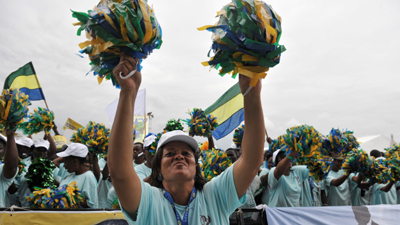New York, September 1, 2009–The Committee to Protect Journalists condemns Gabonese government censorship and restrictions on media coverage of Sunday’s presidential elections, including denials of accreditation to at least four international journalists.
Three front-runners have emerged in the fiercely contested election to determine a successor to Omar Bongo, who died in June after a 41-year rule. They are Ali Ben Bongo, the late president’s son; veteran opposition leader Pierre Mamboundou; and André Mba Obame, a former interior minister. As all sides compete to shape perceptions ahead of Wednesday’s scheduled announcement of official results, their supporters have exerted intense pressure on local and international media.
TV+, a station owned by presidential candidate Obame, suddenly lost its signal on Sunday after airing a 2005 interview with the late president, according to local journalists and Agence France-Presse. The head of the national media regulator, the National Communications Council, did not directly address whether the government interrupted the signal but said the Bongo interview constituted “propaganda” in violation of campaign law, AFP and local journalists reported. In the interview, Bongo says the country is not a monarchy.
Africa 24, a France-based international satellite broadcaster, reported today that its team of journalists in Libreville had been directed to leave the country immediately. Speaking to CPJ from Libreville, News Director Thierry Hot said his newsroom received a call from Christophe Othamot, secretary-general of Gabon’s Communications Ministry, accusing the station of biased coverage, and threatening to withhold accreditation in the future. The threats were linked to the station’s independent reporting of polling estimates unfavorable to the ruling party’s candidate, according to local journalists. The journalists were allowed to stay after the Interior Ministry intervened, according to Hot.
Blaise Mengué Menna, who runs the private bimonthly Tango, told CPJ his newspaper’s distributors, Soga Presse, received an August 11 directive from Othamot ordering it not to publicly distribute the paper’s newest edition. That edition of Tango, which had 1,500 copies, included published photographs of police dispersing an opposition demonstration on August 7, he said. The Gabonese Media Observatory, a media self-regulating body, condemned the order, noting that only the National Communications Council had powers to suspend media outlets. Nonetheless, the issue was not distributed, said Menna, who said he had been forwarded a copy of Othamot’s directive.
Prior to the election, authorities denied accreditations to international journalists from French media outlets–including international broadcaster France 24 and weekly L’Express, which were known for their probing coverage of late President Bongo’s health and wealth, according to news reports and CPJ research. The journalists barred included Virginie Herz and Nicolas Germain of France 24, Vincent Hugeux of L’Express, and Gervais Nitcheu of French public service television RFO–AITV, according to the same sources. Last week, Communications Minister Laure Olga Gondjout, who is also spokeswoman for presidential candidate Ali Ben Bongo, issued a series of directives restricting the media’s access to the polling stations, according to media reports. The directives were not enforced, according to local journalists.
“Instead of supporting media coverage of this important election in Gabon, the Communications Ministry has arbitrarily harassed and censored local and foreign journalists,” said CPJ Africa Program Coordinator Tom Rhodes. “The new cabinet must make a fresh start and allow the press in Gabon to report freely.”
